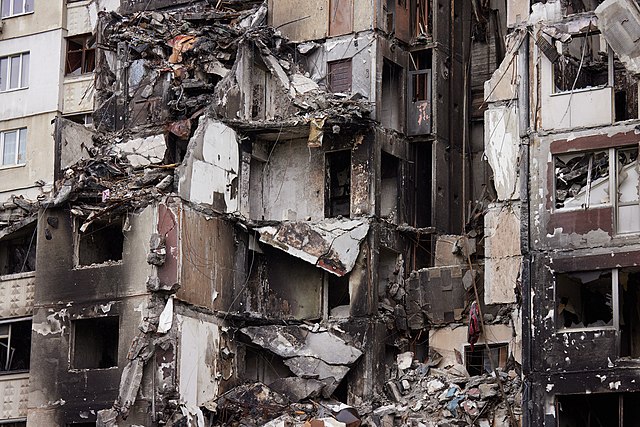Ideological Power: Can Ukraine turn the tide?

Destroyed apartment building in Kharkiv
Ben Johnson -Earlier this week, Ukraine regained over 1,000 square miles of previously Russian-held territory in the northern region of Kharkiv. The remarkable progress of Ukrainian troops was only made sweeter by the hastily performed retreat of the Russian forces. Leaving behind munitions and supplies, the retreating military has also lost a great deal of credibility with supporters in Russia, evidenced by scathing remarks from outspoken supporters of the war. Politicians and commentators in Ukraine are also using their newfound credibility to garner more support abroad. The concept of ideological power can assist in understanding what this victory may mean for the future of the war.
Ideological power describes the ability to influence others, getting them to do what you want without using force. Your policies or objectives are seen as “obvious” or “common sense,” and to do anything different would be breaking the norm. In this case, most of the international community has been relatively confident that Russia will ultimately win or end up controlling part of Ukrainian territory. This isn’t an illogical narrative; Russia is a much larger and more powerful country. Therefore, Russia has been able to wield considerable ideological power, as seen through many western countries withholding more powerful weapons. An example of this, cited from the New York Times, is Germany withholding better arms “as it would only lead to a long and bloody stalemate.” However, Ukraine’s recent victory has begun to undermine this thinking as it prevailed against an enemy with much more material power: a stronger military, economy, and industry. The more Russia must use force, the less credible they become. Thus, not without evidence, Ukraine continues to plead its case to the international community.
Material power is another concept that can add depth to our understanding, specifically of ideological power. Material power has to do with a country's physical attributes and strengths, such as its military and economy. Ukraine is seeking to increase its material power through the international community's support. Their argument is that if they can pull off such a stunning victory with their limited weapons, an increased arsenal of technologically advanced arms would allow them to “throw” Russia out much more quickly. An increase in material power in Ukraine would consequently continue to decrease Russia’s ideological power, illustrated by reports of demoralization among Russian troops. Whether this victory has the power to turn the tide is yet to be seen.

